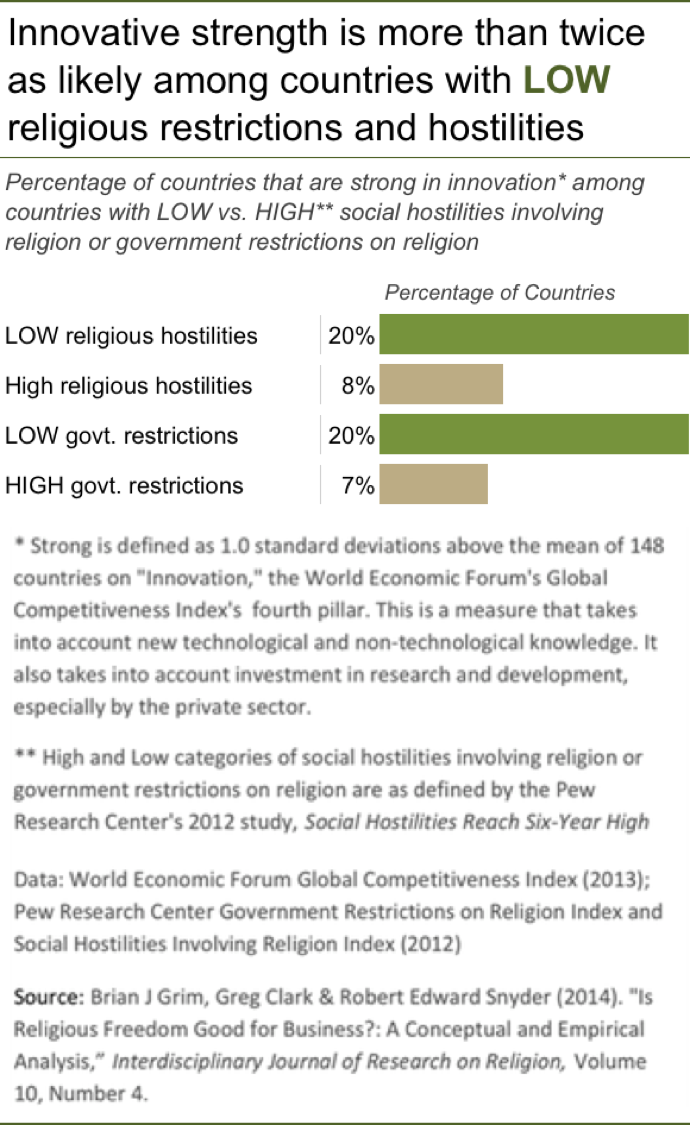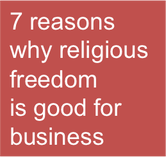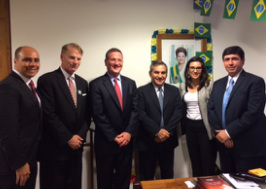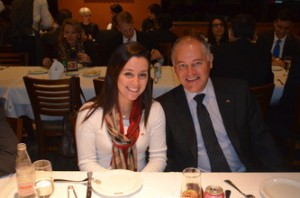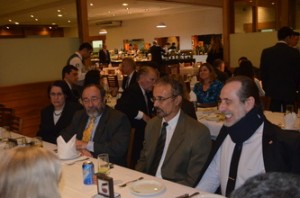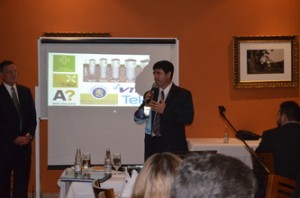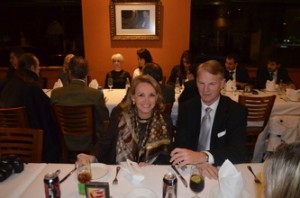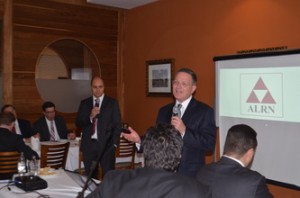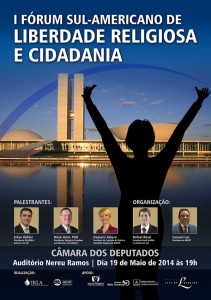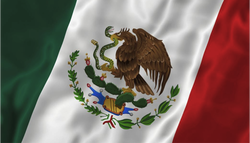But why is it good for business? In short, because religious freedom:
- Fosters respect
- Reduces corruption
- Engenders peace
- Encourages broader freedoms
- Develops the economy
- Overcomes over-regulation
- Multiplies trust
First, religious freedom fosters respect by protecting something that more than eight-in-ten people worldwide, 84 percent according to a recent Pew Research study, identify with – a religious faith. Given that so many people are attached to a faith, to violate the free practice of religion runs the risk of alienating the mass of humanity, something that certainly would not be ideal for morale and socio-economic progress. Indeed, forcing the 16 percent of people with no specific religious attachment to have a religion would likewise be alienating. Religious freedom ensures that people, regardless of their belief or nonbelief, are accorded equal rights and equal opportunity to have a voice in society.
Second, religious freedom reduces corruption, one of the key ingredients of sustainable economic development. For instance, research finds that laws and practices burdening religion are related to higher levels of corruption. This is borne out by simple comparison between the Pew Research Center’s 2011 Government Restrictions on Religion Index with the 2011 Corruption Perceptions Index. Eight of the ten most corrupt countries have high or very high governmental restrictions on religious liberty. Religious freedom also implies that business people can draw on religious values and moral teachings in their businesses. The attempt to force businesses to act as secular, neutral, value-free organizations may be one contributing factor to the corruption, greed and short-sighted decisions that lead to the global economic collapse of 2008 that still affects many people and nations today. Allowing religion to inform business ethnics certainly is an underused activity implied by religious freedom.
Third, research clearly demonstrates that religious freedom engenders peace by reducing religion-related violence and conflict. Conversely, when religious freedom is not respected and protected, the result is often violence and conflicts that disrupt normal economic activities. Religious hostilities and restrictions create climates that can drive away local and foreign investment, undermine sustainable development, and disrupt huge sectors of economies. Such has occurred in the ongoing cycle of religious regulations and hostilities in Egypt, which has adversely impacted the tourism industry. More generally, religious freedom is a key ingredient to peace and stability, which is particularly important for business because, where stability exists, there is more opportunity to invest and conduct normal and predictable business operations, especially in emerging and new markets. This is the topic of the 2011 Cambridge University Press book, The Price of Freedom Denied.
Fourth, religious freedom encourages broader freedoms that contribute to positive socio-economic development. Economist and Nobel laureate Amartya Sen, for instance, argues that societal development requires the removal of sources of “unfreedom.” And restrictions on religious freedom are certainly a source of unfreedom. Removing impediments to religious freedom facilitates freedom of other kinds. And research finds empirical evidence or this relationship. Religious freedom is highly correlated with the presence of other freedoms and a variety of positive social and economic outcomes ranging from better health care to higher incomes for women. While correlations are not causation, the correlations suggest that a more robust future research agenda should focus on better understanding these connections because it appears the freedoms rise or fall together.
Fifth, religious freedom develops the economy. When religious groups operate in a free and competitive environment, religion can play a measurable role in the human and social development of countries. For instance, sociologist Robert Woodberry finds that the presence of proselytizing Protestant faiths, i.e., faiths competing for adherents, was associated with economic development throughout the world in the previous century. Even before that, Alexis de Tocqueville recognized that such Protestant associations in the early U.S. of these sorts established seminaries, constructed inns, created churches, disseminated books, and founded hospitals, prisons and schools. And these contributions are not just a legacy from the past. Katherine Marshall, former director of the Development Dialogue on Values and Ethics at the World Bank and former director in the World Bank’s Africa and East Asia regions, also recognizes that faith communities not only provide education and health services but they also provide social safety nets for orphans, disabled people and people who fall behind.
Sixth, religious freedom overcomes over-regulation that accompanies certain types of religious restrictions that directly limit or harm economic activity. A few current examples from the Muslim-majority countries – a set of countries with particularly high religious restrictions – are illustrative of how the lack of religious freedom contributes to worse economic and business outcomes. Religious restrictions among Muslim-majority countries impacting businesses take many forms. One direct religious restriction impacting economic freedom involves Islamic finance. For instance, businesses involved in creating, buying or selling Islamic financial instruments can find the situation that one Islamic law (sharia) board deems a particular instrument acceptable while another board does not, making the instrument’s acceptance on stock exchanges subject to differing interpretations of sharia. Religious restrictions also include legal barriers for certain import and export industries, such as the halal food market and outright bans of certain blockbusters from the film industry. And, certain government laws and restrictions on religious freedom can stoke religion-related hostilities that disrupt markets throughout the region. Examples range from employment discrimination against women over such things as headscarves to the misuse of anti-blasphemy laws to attack business rivals. And perhaps most significantly for future economic growth, research shows that the instability associated with high and rising religious restrictions and hostilities can influence young entrepreneurs to take their talents elsewhere.
And seventh, religious freedom multiplies trust. Religious freedom, when respected within a company, can also directly benefit a company’s bottom line. These include both lower costs and improved morale. An example of lower costs includes less liability for litigation. For instance, the clothing retailer Abercrombie & Fitch fought and lost a religious discrimination case in 2013 related to firing a Muslim stock girl for wearing a scarf in violation of the company’s dress code. The case resulted not only in substantial legal costs but also negative national publicity. Respect for reasonable accommodation of religious freedom in the workplace can improve employee morale, increase retention of valued employees, and help with conflict resolution. Moreover, businesses may gain a competitive advantage by engaging stakeholder expectations that are increasingly demanding that companies play a positive role in addressing environmental, social and governance challenges. As recognized by business consulting group McKinsey & Company, the ethical stakeholder has clearly emerged and is on the rise. Important business stakeholders include business partners, investors and consumers, and a growing segment of ethically sensitive customers tend to prefer companies that are responsive to human rights. Indeed, consumer and government preferences given to human-rights-sensitive companies may give a company an advantage in competitive markets and enable it to charge premium prices and land choice contracts. And recognizing this human rights impact on branding, companies such as Gap have assumed shared responsibility for the conditions under which its goods are manufactured.
Given that religious freedom contributes to better economic and business outcomes, advances in religious freedom are in the self-interest of businesses, governments and societies. While this observation does not suggest that religious freedom is the sole or even main anecdote to poor economic performance, it does suggest that religious freedom is related to economic success. Certainly, businesses would benefit from taking religious freedom considerations into account in their strategic planning, labor management and community interactions. For instance, when evaluating locations for future research and development operations, countries with good records on religious freedom may be a better environment to find societies open to innovation and experimentation.


